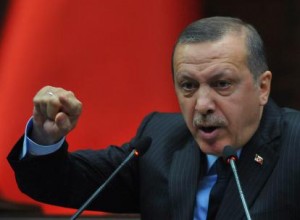Turkish Prime Minister Recep Tayyip Erdogan announced that Turkey would be downgrading its diplomatic relations with Israel and cutting all military ties with the state. A few days after the announcement, he stated that there would also be an increase in Turkish ships patrolling the Eastern Mediterranean to ensure the safety of maritime navigation, implying the danger came from the Israeli navy. He also tacitly threatened Israel by stating that Turkish warships would escort humanitarian missions and flotillas going to Gaza. As a result of the Prime Minister’s decision, it is now more or less confirmed that Turkish-Israeli relations have passed the reconcilable threshold. Reporters across the media world are offering their opinions on the consequences of Prime Minister Erdogan’s comments and decisions. Though, a deeper theoretical explanation of Turkey’s actions against Israel show that these decisions were a result of many calculated variables unrelated to the recent tensions between the two states.

Turkish Prime Minister Recep Tayyip Erdogan seems set on breaking ties with Israel. But will it translate in to Turkey becoming the dominant regional power it envisions? (Photo: The Hurriyet Daily News)
Since the 1920’s, Turkey has committed itself to being a modernized, secular, Western-style state. However, in the past few years it has begun to slowly challenge these values. Prime Minister Erdogan and his AK party have made it their primary objective to place Turkey back in the heart of the Islamic world. Since around 2008, Erdogan has amplified his push for Turkish empowerment by increasing the role of Islam in Turkish society and politics, as well as engaging Israel in political standoffs and diplomatic conflict. Noticeably, the last four or five months have seen an exponential increase in his efforts. But why? International relations theorist Robert Gilpin wrote that regions are in equilibrium when states believe it is not profitable to change the status quo. Equilibrium is a state of being, where no present international conflict is capable of fully changing the dynamic of the region. A country may want to change the status quo, but the costs may outweigh the benefits. The Middle East’s equilibrium has been massively overturned by the Arab Spring. This recent change is providing Turkey with the opportunity to alter the regional spectrum, and as will be discussed later, has lead to the erosion of its alliance with Israel.
Before the Arab Spring, Iran and Saudi Arabia were viewed as the Islamic powerhouses, and Turkey and Egypt were considered the Western (Israel) influenced states. While respected by its Muslim counterparts, an unprovoked Turkish separation from the West and Israel, in combination with its increasing acceptance of Islam, might have been viewed by Iran and Saudi Arabia as a threat to their regional positions. It is also doubtful that breaking off from the Jewish state would have lead to Turkey’s ascension as the recognized leader of the Muslim world. Instead of attempting to cut itself off without cause, Turkey chose to patiently maintain its relationship with Israel. It continued to reap the economic and military benefits until the region’s equilibrium shifted naturally. The natural shift has come in the form of the Arab Spring. With mass movements sweeping the entire Middle East, both Iran and Saudi Arabia are now walking on eggshells. Dangerous uprisings or civil war could flare up at any moment. Their vulnerability has left their international political capabilities crippled, making them lame duck leaders. With the fall of former Egyptian dictator Hosni Mubarak, Egypt is no longer considered to be in Israel’s back pocket. As a result,Turkey is the only stable “ally” the West and Israel have in the region. The combination of political stability and strength, the lack of alternative leaders in the Middle East, and its newfound leverage over Israel and the West, has left Turkey with a unique opportunity for self-empowerment. With the benefits now outweighing the costs,Turkey has aggressively sought to re-position itself as the dominant regional, Islamic power.
Erosion of the Turkish-Israeli relationship comes as no surprise. History has shown that the leaders of the Muslim world cannot be friends of Israel. The fact that the two have had such close ties has raised the eyebrows of more than a few. But, the regional transformation is allowing Turkey to rally support in a manner unbeknownst to the traditional Muslim powers. Erdogan is playing it off as though he gave Israel a sincere chance to make nice. He blames Israeli leaders for not being interested in peace, and uses the Palestinian dilemma and the stopping of illegal Turkish flotillas to Gaza as support. It is media and propaganda gold. He poses the question: if the most successful Islamic democracy in the world cannot make it work with Israel, who can? With a lack of leadership in the Middle East all Turkey has to do is keep riding this public relations wave. Turkey used to be seen as possibly the only Muslim country that could mediate the Middle Eastern peace process. Now, it is climbing to the top of the regional hierarchy at its expense. At some point Turkey will likely attempt to solidify its leadership coup by officially cutting off ties with Israel and building stronger alliances with its Muslim neighbors.

Does Turkey really want war with Israel? There is bound to be a confrontation if Turkish warships try to break the blockade of Gaza. (Photo: Bestcactus.com)
The deterioration of the Turkish-Israeli alliance is hardly Israel’s fault alone. In fact, Israeli Prime Minister Benjamin Netanyahu has openly stated that his top priority right now is to continue to mend the relationship. He has also rejected the extreme suggestions of his Foreign Affairs minister, Avigdor Liberman, on how Israel should retaliate towards Turkey. Regardless, Prime Minister Erdogan and his government show no signs of remorse or feelings of reconciliation. They have rejected the UN Palmer report which called the Israeli blockade of Gaza legal, they have told Israel that an apology and compensation for the victims of last years flotilla incident will no longer be enough to reconcile, and Erdogan has not stopped his aggressive rhetoric. Just yesterday, in the Egyptian publication, Al-Shorouk, he accused Israel of sponsoring state terrorism. In a sense, Israel cannot really take this episode with Turkey personally. If one accepts, even in part, that Turkey has always been waiting for the right time to take control of the region, this feud was going to happen one way or the other, regardless of Israel’s policy choices.